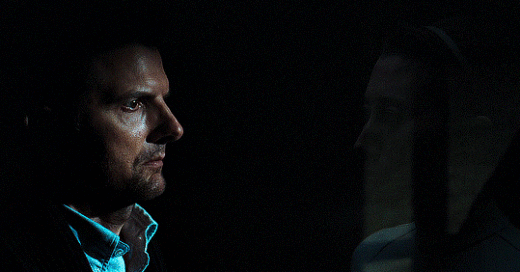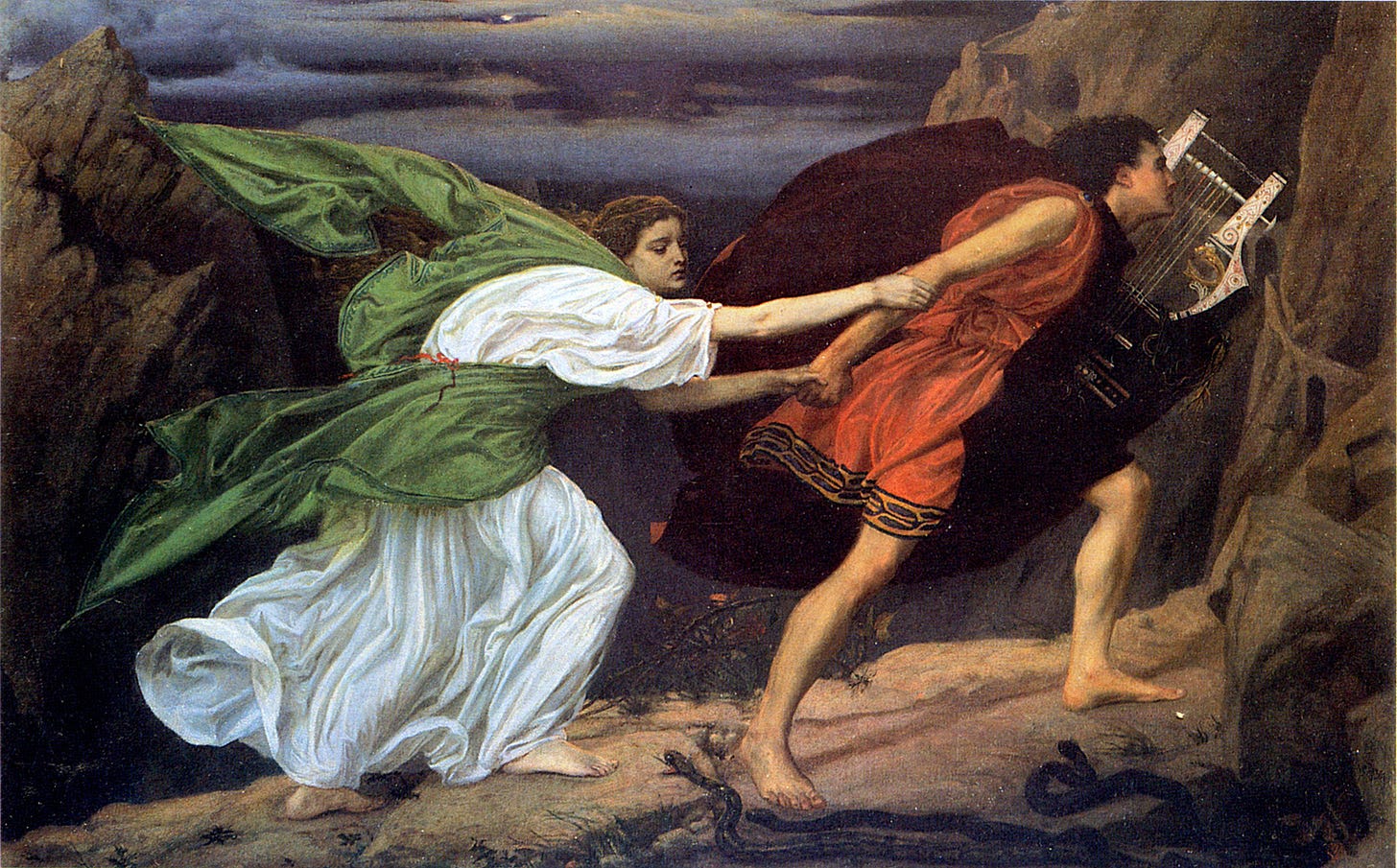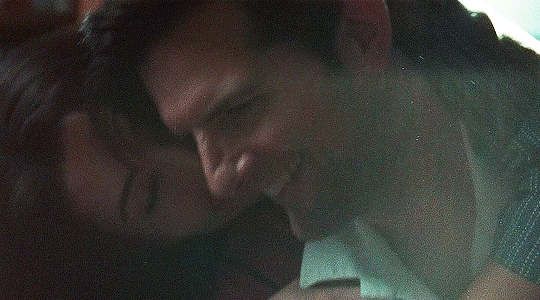love in the time of severance
severance's gemma episode (2x07): on commercialized consciousness, russian literature, and the orpheus & eurydice of it all
“Eurydice, dying now a second time, uttered no complaint against her husband. What was there to complain of, but that she had been loved?”1
this post contains spoilers for Severance season 2, episode 7 and is too long for email, so please read on desktop or the app!
In the bleak, wintry landscape that the world of Severance is perpetually trapped in, a glimpse of spring emerges in fragments. Hazy vignettes bathed in filtered sunlight and the soft glow of warm memories replace the typical sterile hallways of the Lumon severed floor. On a picturesque autumn day, Mark and Gemma meet, and the beginning of a heartwrenching end unfolds. Their story, patched and sewn together in grainy film and ephemeral moments, form the quilt of memories that both Mark and Gemma desperately cling onto in the present—trapped in their own hell, separated ad infinitum, one floor apart.
The latest Severance episode discloses a horrifying revelation: there is another hell below the hell we are familiar with. Gemma has been alive this entire time, subjected to unimaginable torture that extends far beyond organizing numbers into folders. In flashbacks dispersed throughout the episode, Gemma’s past life begins to materialize—as a professor, a wife, a sister in law, a mother desperate to have a child. In the near-present, Gemma’s current life is fractured into different nameless ‘innies,’ each sentenced to a perpetual cycle of suffering day-to-day pains and groans in simulation rooms—experiencing painful dental procedures, enduring extreme plane turbulence, writing thank-you notes for Christmas gifts. It is difficult to miss the names of the rooms as well, all of which match the names of the files on Mark’s computer on the severed floor.
‘Chikhai Bardo’ is one of the best episodes of television I have ever seen. Gemma, who solely existed in the realm of retaped photographs and Mark’s memories in previous episodes, is brought to life through the stunning cinematography in Jessica Lee Gagné’s directorial debut. It offers layers of a long-awaited backstory illuminated through color palettes and transitions significantly divergent from Severance’s other episodes, and of course, I had to write a long, 3500 word essay, breaking down the episode along with all of my thoughts—the cinematography, the foundations of humanity, commercializing humanity, Greek mythology and Russian literature references (two of my favorite niches in literature), and some of my theories and implications for the show and its characters going forward.
I am not typically a masochist, but there is a certain genre of media I love torturing myself with, one that awakens the dormant hopeless romantic that lays beneath the hundred feet of solidified volcanic rock in the recesses of my heart: tragic love stories that transcend time and space. Some in this genre include La La Land, Past Lives, Eternal Sunshine of the Spotless Mind, and so on. There’s something hauntingly beautiful about love in the face of tragedy and grief, love as a fear of loss, and this is what the most recent episode of Severance felt like. Especially after it basically spelled out that Mark and Gemma’s story is a loose retelling of Orpheus and Eurydice.
There are only a few myths that resonate as profoundly as the one of Orpheus and Eurydice. This story, most famously portrayed in Virgil’s fourth Georgic and Ovid’s Metamorphoses, tells the tale of Orpheus’ desperate quest to retrieve his dead wife from the underworld. Shortly after the couple’s marriage, Eurydice dies after being bitten by a snake, and a grief-stricken Orpheus, renowned for his prodigious musical prowess, plays the lyre day and night with such melancholic beauty that it moves Hades himself. The god of the underworld, touched by the demi-god’s love for his beloved wife, offers him one chance to lead her out of hell, with one caveat: Orpheus must not turn around under any circumstance in their ascent.
This is where the narrative diverges across different versions of the myth. In one version, Eurydice trips. In another, Orpheus is suddenly unable to hear her footsteps. In perhaps the most human one, doubt permeates Orpheus’s mind of whether or not he was fooled by the god. But the reason ultimately does not matter, as Orpheus’ grave error is consistent in every variation: he turns around. And so Eurydice tumbles, as a result, slipping back into the dark abyss of the underworld. Orpheus leaves the place the same way he entered—grieving the loss of his wife, now with the heavy, leaden guilt that her second death is entirely his fault.
ORPHEUS:
How will you remember?
EURYDICE:
That I love you?
ORPHEUS:
Yes.
EURYDICE:
That’s easy. I can’t help it.2
In Portrait of a Lady on Fire (2019, dir. Celine Sciamma), Marianne makes sense of Orpheus’ decision to look back, saying, “Perhaps he makes a choice. He chooses the memory of her. That’s why he turns. He doesn’t make the lover’s choice, but the poet’s.” However, Orpheus’ action is not a dichotomy between, but both a lover’s and poet’s choice. This is a constant throughout the multiple versions of the story, regardless of the reasons he turned around. In essence, Orpheus turns around because he loves Eurydice; loving her is not a deliberate decision anymore but an instinct that is ingrained in him, etched in muscle memory.
This love is reminiscent of Rubin’s vase and the concept of reversible figures: Blink once and it’s a vase and empty space. Blink twice and it’s two people staring at each other. Blink thrice and you see both at the same time, your conscious perception alternating between the two. Orpheus turning around is ironically and simultaneously representative of the fallibility of human nature, as well as a love that transcends the said fallibility. And isn’t that perhaps the best and worst thing about love? The myth is perhaps a cautionary tale of doubt, but it is also a portrayal of a love that supersedes logic and reason. And so he watches, because he loves her, as she falls to her death.
Looking back into the depths of the underworld is his final act of love for his wife—someone he loved enough to willingly walk into hell for.
And what was there to complain of, but that she had been loved?






